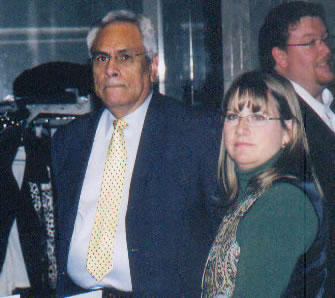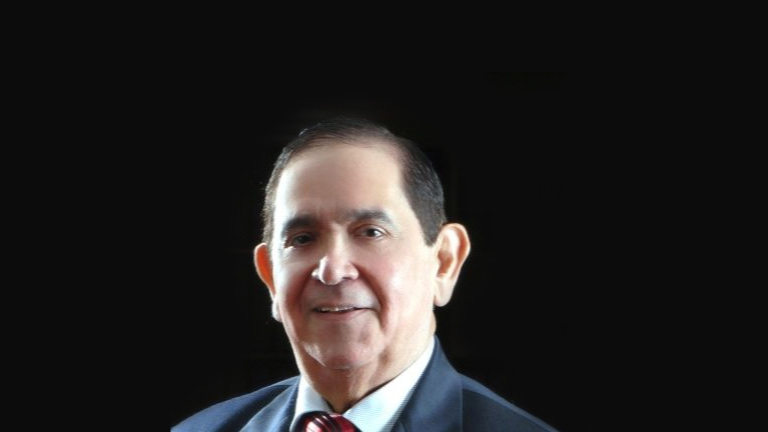[:en]David Catalan long searched for a place to call home before finding it in Omaha four decades ago.
Born in San Diego, Calif. and raised in Arizona, the former business executive turned consultant has served on many nonprofit boards. It’s hard to imagine this sophisticate who is so adroit in corporate and art circles once labored in the migrant fields with his Mexican immigrant parents. It’s surprising, too, someone so involved in community affairs once lived a rootless life.
“My whole life had been like a gypsy. I was a vagabond because traveling from place to place and never really having a fixed home – until I came to Omaha with Union Pacific in 1980.. I chose to stay even after I left U.P. because I really felt at home here and still do after all those years wandering around.”
Vagabundo, a book of his own free-style verse, describes his coming-of-age.
Catalan, 76, grew up in a Tucson barrio immediately after World War 1. His father worked in the copper mines. When Catalan was about 13, his family began making the migrant worker circuit, leaving each spring-summer for Calif, to pick tomatoes, figs, peaches and grapes and then returning home for the fall-winter.
“I didn’t really feel I wanted to get stuck in that kind of a destiny,” he said. “Maybe escape is too rough a word, but I had to get away from that environment if I was going to do anything differently, and so I left and went to live with a sister in the Merced (Calif.) area.”
He finished high school there and received a scholarship to UCLA, “I was the only one in the family that actually completed high school, let alone college.”
He’d long before fallen in love with books.
“That led me to realize there was more I could accomplish.”
While at UCLA, a U.S. Army recruiter sensed his wanderlust and got him to enlist. He served in Germany and France. He stayed-on two years in Paris, where an American couple introduced him to the arts.
“It was a big awakening for me,” he said.
Back in the U.S., he settled in Salt Lake City, where he was briefly married. Then he joined U.P., which paid for his MBA studies at Pepperdine University. Then U.P. transferred him from Los Angeles to Omaha.
“I never had a sense of knowing my neighbors, having some continuity in terms of schools and experiences, so I felt like I had missed out by not having had that identity with place and community. When I came to Omaha, I loved it, and U.P. really promoted employees getting involved in community service.
“Doing community service, being on nonprofit boards became an identity for myself.”
Upon taking early retirement, he worked at Metropolitan Community College, in the cabinet of Mayor Hal Daub and as executive director of the Omaha Press Club and the Nonprofit Association of the Midlands.
“I threw myself into the nonprofit world.”
He’s served on the Opera Omaha, Omaha Symphony and Nebraska Arts Council boards.
He cofounded SNAP! Productions, a small but mighty theater company originally formed to support the Nebraska AIDS Project.
“Omaha was the first place I saw a couple friends die of AIDS and that was a real revelation for me. That got me working to do some fundraising.”
SNAP! emerged from that work.
“I was the producer for almost every production the first few seasons. The audience base for SNAP! is a very accepting part of the community. It was gratifying. It’s been very successful.”
His interests led him to South Omaha, where he helped found El Museo Latino. More recently, he helped get the South Omaha Museum started.
He also served as president of the South Omaha Business Association.
“I got involved with a lot of economic development.”
He wrote and published Rule of Thumb: A Guide to Small Business Marketing.
He’s “very proud” both SNAP! and El Museo Latino, whose vision of Magdalena Garcia he caught, “are still going strong and still serving the community.”
Each time he gets involved, he said, “it isn’t planned – the need arises and I’m there willing to help work to make it happen.”
“Doing all this work helps me feel I am a part of a dynamic community. That’s what really drives me, motivates me and makes me feel very positive.”
He’s involved in a new project that dreams of building a 300-foot tall Nebraska landmark destination to be called “Tower of Courage” at the intersection of 13th and I-80 across from the Henry Doorly Zoo.
“We’re in the process of trying to acquire the land. It’ll be a place for culture-history exhibits all focused on the rich cultural and historical history of Neb. and the region.”
Meanwhile Catalan has his own consulting company helping nonprofit and small business clients with strategic planning and grant-writing.
He’s also active in the Optimist Club.
“I’ve lived a full life. I’ve met so many wonderful people. I can navigate around many communities because of the the work I’ve done and the people I’ve met.”
He’s doing research for what may be his third book: weaving the story of a pioneering Jesuit priest from the same Sonora. Mexico hometown Catalan’s mother was born in and near where his father was from, with the history of area Indian tribes and his own family.
He’s traveling this winter to Sonora – not to escape his roots but to discover more about them.
He’s written about his family in Vagabundo and in poems published in the literary journal, Fine Lines.
“I think I’m creating a David Catalan space of my own I never had growing up.”
Read more of Leo Adam Biga’s work at leoadambiga.com.[:es]Por mucho tiempo David Catalán había buscado un lugar al que llamar hogar antes de encontrarlo en Omaha hace cuatro décadas.
Nació en San Diego, California y creció en Arizona. El antes ejecutivo comercial y ahora consultor ha servido en los consejos de muchas organizaciones sin fines de lucro. Es difícil imaginar a este sofisticado individuo, quien es tan diestro en los círculos corporativos y de arte, en su momento trabajando en los campos con sus padres inmigrantes. También sorprende que alguien tan participativo en las cuestiones de la comunidad en un momento viviera una vida sin echar raíces.
“Toda mi vida yo había sido como un gitano. Yo era así pues viajaba de lugar en lugar sin tener un hogar fijo hasta que llegué a Omaha con Union Pacific en 1980. Yo escogí quedarme aún después de dejar a Union Pacific pues aquí me sentí como en mi hogar y todavía me siento así después de todos esos años de estar por todos lados”.
Vagabundo, un libro con sus versos de estilo libre, describe sus vivencias.
Catalán, hoy de 76 años de edad, creció en un barrio en Tucson inmediatamente después de la Segunda Guerra Mundial. Su padre trabajó en las minas de cobre. Cuando Catalán tenía alrededor de 13 años, su familia comenzó a pasar por el circuito de migrantes trabajadores, saliendo cada primavera-verano para California para recoger tomates, higos, duraznos y uvas, regresando a casa durante el otoño-invierno.
“Yo sentí que no quería quedarme atorado en ese tipo de destino”, comenta. “Tal vez escapar es una palabra demasiado dura, pero si quería hacer las cosas diferentemente yo tenía que alejarme de ese ambiente, por lo que me fui a vivir con una hermana al área de Merced (California)”.
El terminó de estudiar ahí y recibió una beca de UCLA.
“Yo era el único de mi familia que completó la preparatoria y ni qué decir de la universidad”.
Él se había enamorado de los libros desde tiempo atrás.
“Eso me llevo a darme cuenta de que había más cosas que yo podía lograr”.
Estando en UCLA, un reclutador del Ejército de los EE.UU. presintió sus ansias por viajar y le convenció de enlistarse. Él sirvió en Alemania y Francia. Estuvo dos años en París, donde una pareja estadounidense le introdujo a las artes.
“Fue un gran despertar para mí”, nos dijo.
De vuelta en los EE.UU., él se asentó en Salt Lake City, en donde estuvo casado por un corto tiempo. Después entró a Union Pacific, quien pagó por sus estudios de MBA en la Universidad Pepperdine. Después United Pacific le transfirió de Los Ángeles a Omaha.
“Yo nunca había llegado a conocer a mis vecinos, a ser parte de una comunidad en cuanto a escuelas y experiencias, por lo que siento que me perdí de todo eso al no tener esa identidad sobre el lugar y la comunidad. Cuando llegué a Omaha me encantó y United Pacific en verdad fomentaba que sus empleados participaran en servicio comunitario.
“El realizar servicio comunitario, el ser parte de los consejos de organizaciones sin fines de lucro, eso se convirtió en una identidad”.
Después de una jubilación anticipada, él trabajó en el Metropolitan Community College, en el gabinete del Alcalde Hal Daub y como Director Ejecutivo del Omaha Press Club y la organización sin fines de lucro Association of the Midlands.
“Me lancé de lleno hacia el mundo de las organizaciones sin fines de lucro”.
Él ha servido en los consejos de la Opera de Omaha, de la Sinfonía de Omaha y del Consejo de las Artes de Nebraska.
Él co-fundó SNAP! Productions, una pequeña pero poderosa compañía teatral originalmente formada para apoyar el Proyecto Nebrask AIDS.
“Omaha fue el primer lugar en donde yo experimenté de la muerte de algunos amigos por sida y eso para mí fue una revelación. Eso me puso a trabajar para hacer algo para recaudar fondos”.
SNAP! surgió de ese trabajo.
“Yo fui el productor de casi todas las producciones de las primeras temporadas. La base del público de SNAP! es una parte muy comprensiva de la comunidad. Fue muy gratificante. Ha tenido mucho éxito”.
Su interés le llevo al Sur de Omaha en donde ayudó a fundar El Museo Latino. Recientemente él ayudó a que el Museo del Sur de Omaha comenzara sus labores. Él también ha fungido como Presidente de la South Omaha Business Association.
“Yo me involucré mucho en el desarrollo económico”.
Él escribió y publicó Rule of Thumb: A Guide to Small Business Marketing (Una guía para el marketing de las pequeñas empresas).
Se encuentra muy orgulloso tanto de SNAP! como de El Museo Latino, en donde la visión de Magdalena García considera “es igual de fuerte y continúa sirviendo a la comunidad”.
Cada vez que él se involucra, nos dice, “no es algo planeado – la necesidad surge y yo estoy ahí dispuesto a ayudar para hacer que suceda”.
“Hacer todo este trabajo me ayuda a sentirme parte de una comunidad dinámica. Eso es lo que en verdad me impulsa, me motiva y me hace sentir muy positivo”, nos dice.
Él ahora está involucrado en un nuevo proyecto para construir un destino emblemático de 300 pies de altura en Nebraska llamado la “Tower of Courage” (Torre del Valor) en la intersección de la 13va y la I-80 frente al Zoológico Henry Doorly.
“Estamos en el proceso de intentar adquirir el terreno. Será un lugar para exhibiciones de cultura e historia con un enfoque en la rica historia cultural e histórica de Nebraska y la región”.
Mientras tanto Catalán cuenta con su propia firma de consultoría desde donde se ayuda a sus clientes en organizaciones sin fines de lucro y a los pequeños negocios con planeación estratégica y solicitudes de subvenciones.
Él también es muy activo en el Club de los Optimistas.
“He vivido una vida plena. He conocido a personas maravillosas. Yo puedo navegar en muchas comunidades debido al trabajo que he hecho y a las personas que he conocido”.
Él está investigando para lo que podría ser su tercer libro: unir la historia de un pionero sacerdote jesuita del mimo pueblo natal en Sonora en donde nació la madre de Catalán y cerca de donde era su padre, con la de las tribus indias del área y su propia familia.
El viajará este invierno a Sonora, no para escapar de sus raíces sino para descubrir más sobre ellas.
Catalán ha escrito sobre su familia en Vagabundo y en los poemas publicados en la revista literaria Fine Lines.
“Yo pienso que estoy creando un espacio de David Catalán propio que nunca tuve cuando me estaba criando”.
Lea más del trabajo de Leo Adam Biga en leoadambiga.com.[:]




